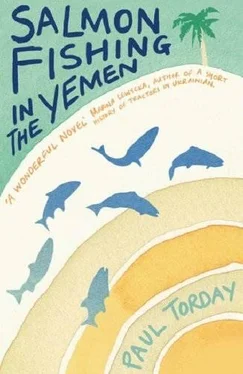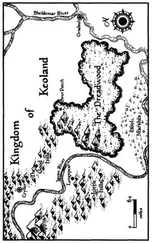When I had finished I inspected the clothes laid out for me on the bed. There were evening clothes, shirt and black tie, clean underwear, socks, which all fitted as if they had been made for me. On the rug beside the bed was a pair of black loafers, gleaming with polish. These also fitted like gloves. Somehow I was not surprised. I left my room and, as I came to the landing at the head of the stairs, I saw Harriet coming towards me from the other wing of the house. She was wearing a stunning black evening dress, with a gold belt around her waist. I have to admit she looked surprisingly glamorous. She saw me, smiled and said, ‘I’m so sorry you have been kept waiting. His Excellency has many duties and unfortunately had to take time to deal with them this afternoon.’
I bent my head in acknowledgement. I no longer minded having been kept waiting all day. I felt curious and expectant, as if some important secret was about to be revealed to me. I was looking forward to meeting Harriet’s client.
We went downstairs together. Harriet was wearing a perfume which, although faint, reminded me of the smell in a garden on a summer evening after rain. I found myself inhaling it as I walked down the stairs behind her. Mary says expensive perfumes are a form of feminine exploitation and no substitute for the frequent application of soap and water. We entered the library, and there standing in the centre of the rug in front of a log fire was the small man in white robes I had seen on the road earlier that afternoon. Now I noticed that the robes, and his headdress, were edged with gold. His face was dark-skinned with a grey moustache and beard beneath a hook nose and small, deep-set brown eyes. He had an air of stillness about him and stood very upright so that one forgot his height.
‘Welcome to my house, Dr Alfred,’ he said, extending a hand.
I went forward to take it and as I did so Harriet said, ‘May I present His Excellency Sheikh Muhammad ibn Zaidi bani Tihama.’
I shook hands and we all stood and looked at each other, and then Malcolm arrived with a silver tray with a tumbler of whisky and soda and two flutes of champagne. Sheikh Muhammad took the whisky, and Malcolm asked me if I wanted something else, or would the champagne be acceptable?
‘You are surprised,’ said Sheikh Muhammad, in his clearly very good English, ‘that I drink alcohol. In my homes in the Yemen, of course, I never do; there is none in any of my houses. But when I discovered that whisky was called the water of life, I felt that God would understand and forgive me a little, if I drank it in Scotland from time to time.’ His voice was deep and sonorous, with few of the guttural sounds that Arabic speakers sometimes have.
He sipped his tumbler of whisky and made an appreciative, soundless ‘Ah’ shape with his lips. I took a sip of my champagne. It was cold, and delicious.
‘You are drinking the Krug ‘85,’ said Sheikh Muhammad. ‘I do not drink it myself, but friends are kind enough to say it is palatable.’ He motioned us to sit down, and Harriet and I settled side by side on one large sofa, whilst he sat opposite us. Then we began to speak about the salmon project. Although it is late now, I remember very clearly the sheikh’s words. He is a man, I think, whose presence and words would not be quickly forgotten by anyone who met him.
‘Dr Alfred,’ said Sheikh Muhammad, ‘I greatly appreciate the work you have done so far on the proposal to bring salmon to the Yemen. I read your proposal and I thought it most excellent. But of course you think we are all quite mad.’
I muttered something along the lines of ‘Not at all’ but he waved away my denials.
‘Of course you do. You are a scientist-a very good one, I am informed. A leading light in the National Centre for Fisheries Excellence. Now come some Arab people who say they want salmon! In the Yemen! To fish! Of course you think we are quite mad.’
He sipped at his glass and then looked around. Malcolm appeared from nowhere with small tables for us to put our drinks on, then faded away to some corner of the room out of the light.
‘I have observed,’ said His Excellency, ‘over the many years I have been coming to this country, a curious thing. Will you forgive me if I speak frankly about your countrymen?’ I nodded, but he had taken my forgiveness for granted because he continued almost without a pause. ‘In this country you still have a great deal of snobbery. In our country we too have many different ranks but everyone accepts these ranks without question. I am a sheikh from the sayyid class. My advisers are cadis. My estate workers at home are nukkas or even akhdam . But each knows his place and each talks to the other without restraint or fear of ridicule. Here in the UK this is not the case. No one seems to know what class they belong to. Whatever class they do belong to, they are ashamed of and want to appear as if they are from another. Your sayyid class put on the speech of the nukkas in order not to stand out, and speak like taxi drivers and not lords because they are afraid of being thought ill of. The reverse is also true. A butcher, a jazr , might make a great deal of money and adopt the speech of the sayyid class. He too is uneasy in case he pronounces a word wrongly or wears the wrong sort of tie. Your country is ridden with class prejudices. Is this not the case, Harriet Chetwode-Talbot?’
Harriet smiled and inclined her head ambiguously, but did not say anything.
‘But I have for a long time observed,’ said His Excellency, ‘that there is one group of people who in their passion for their sport ignore all things to do with class. The sayyid and the nukka are united and stand together on the riverbank and speak freely and without restraint or self-consciousness. Of course I speak about salmon fishermen, indeed fishermen of all descriptions. High and low, rich and poor, they forget themselves in the contemplation of one of God’s mysteries: the salmon, and why sometimes it will take the fly in its mouth and sometimes it will not.’
He sipped at his whisky again, and Malcolm was there at his elbow with a decanter and a soda siphon.
‘My own people have their faults, too,’ continued the sheikh. ‘We are an impatient people, and sometimes violent, very quick to pick up a gun to finish an argument. Although our society is in many ways an ancient and well-organised one, we are first members of our tribe, and only second members of our nation. After all, my family and my tribe have lived in the mountains of Heraz for over one thousand years, but my country has existed for only a few decades. There are still many divisions in our country, which not long ago was two countries and much longer ago was many kingdoms: Saba, Najran, Qa’taban, Hadramawt. I have noticed in this country that although there is violence and aggression-your football hooligans, for instance-there is one group for whom patience and tolerance are the only virtues. I speak of salmon fishermen in particular, and all fishermen in general.’
Sheikh Muhammad’s voice was gentle and quiet, but he had the gift of compelling attention and respect with every word he spoke. I said nothing, not daring or wishing to break his chain of thought.
‘I have formed the view that the creation of a salmon river in the Yemen would in every way be a blessing for my country, and my countrymen. It would be a miracle of God if it happened. I know it. My money and your science, Dr Alfred, would not alone achieve any such thing. But just as Moses found water in the wilderness, if God wills it, we will enable salmon to swim in the waters of Wadi Aleyn. If God wills it, the summer rains will fill the wadis, and we will pump out water from the aquifer, and the salmon will run the river. And then my countrymen- sayyid, nuqqa and jazr and all classes and manner of men-will stand on the banks side by side and fish for the salmon. And their natures, too, will be changed. They will feel the enchantment of this silver fish, and the overwhelming love that you know, and I know, Dr Alfred, for the fish and the river it swims in. And then when talk turns to what this tribe said or that tribe did, or what to do with the Israelis or the Americans, and voices grow heated, then someone will say, ‘Let us arise, and go fishing.’’
Читать дальше












